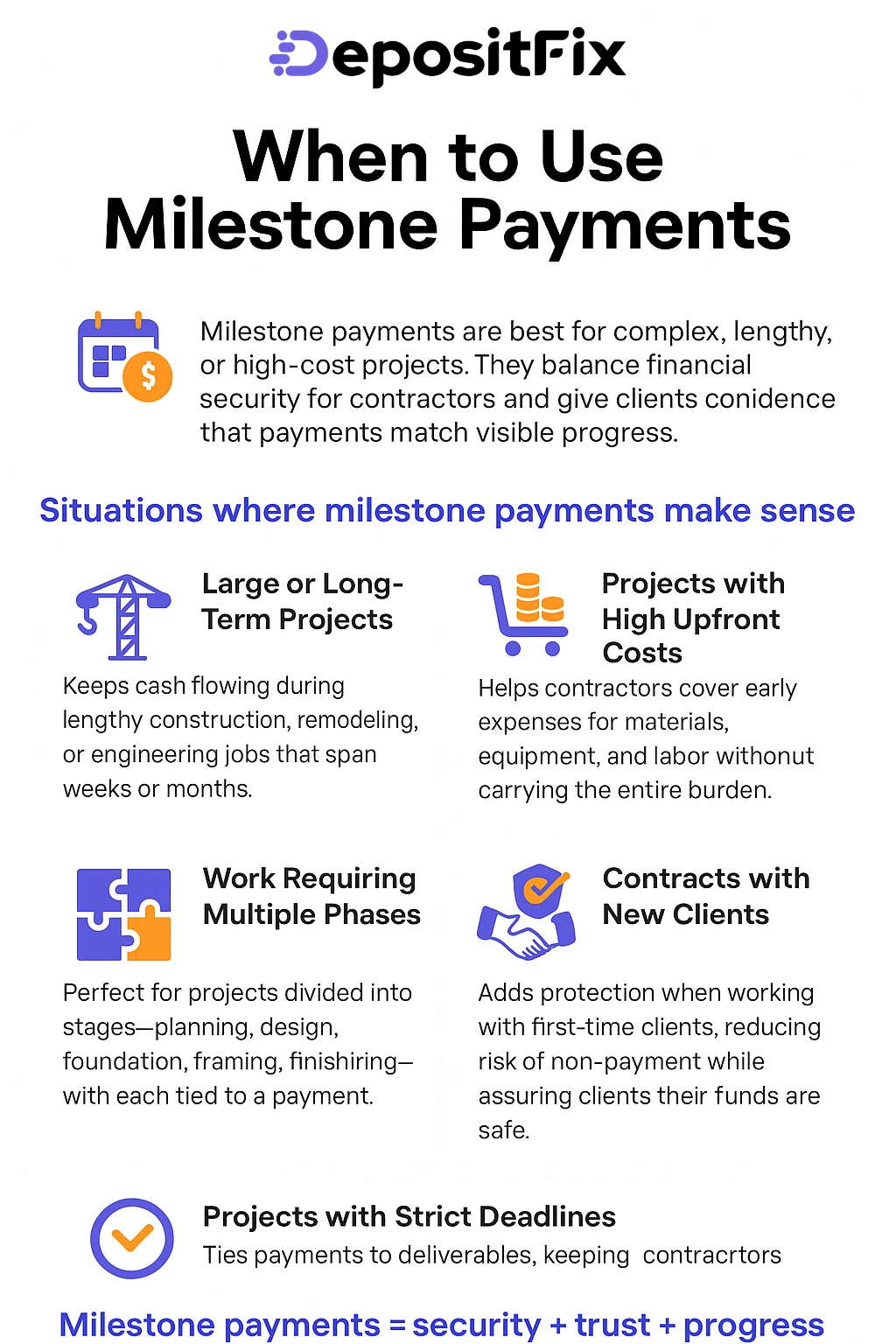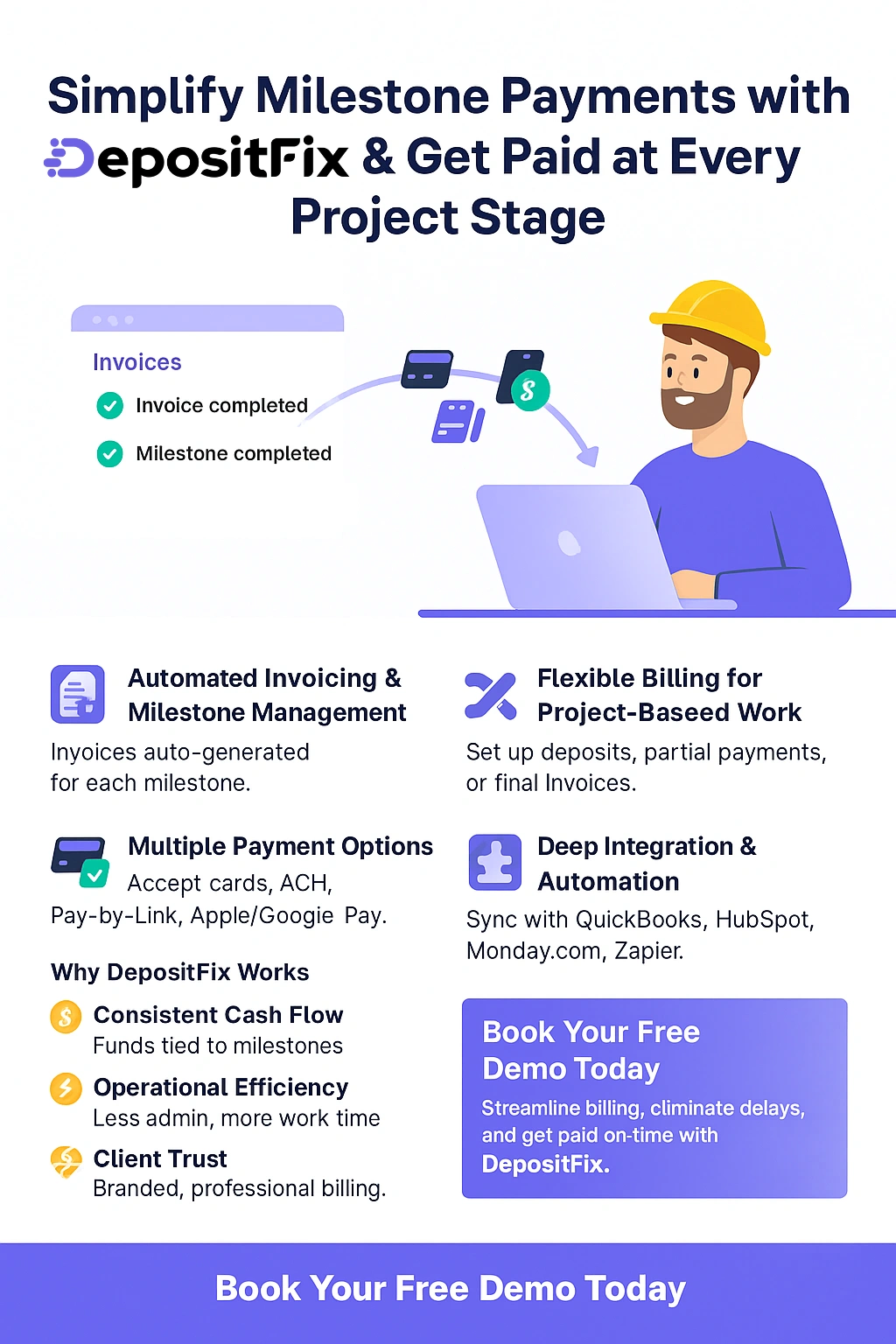A milestone payment is a payment made at a specific stage of a project, rather than waiting until the entire job is complete. For contractors, this means dividing a project’s total cost into smaller, agreed-upon installments that are released once certain tasks or phases are finished.
This payment structure gives contractors a steady cash flow to cover labor, materials, and overhead while also giving clients peace of mind that they’re only paying for progress that’s been delivered.
A milestone payment is a structured way of compensating contractors and service providers based on the completion of predefined stages within a project. Instead of waiting until the very end to receive a lump sum, the project cost is broken down into smaller installments that are tied to key deliverables or phases of work.
For example, in a construction project, a client may agree to release an initial deposit before work begins, another payment once the framing is completed, and subsequent payments as roofing, electrical, or finishing tasks are delivered.
Each “milestone” acts as a checkpoint that demonstrates measurable progress, ensuring that the contractor is funded to continue operations while the client retains assurance that payments align with actual work performed.
This arrangement not only improves cash flow for contractors, helping them cover labor, materials, and equipment costs, but also reduces financial risk for clients, since they are only paying once tangible progress is verified.
Milestone billing is common in industries where projects are lengthy, resource-intensive, and dependent on timely funding, making them especially valuable in construction, engineering, and large-scale contracting.
Milestone payments provide a fair and balanced approach to managing project finances for both contractors and clients. They break down payments into smaller, manageable installments tied to specific deliverables, and create accountability, improve trust, and keep projects moving forward smoothly.
Here are the benefits of milestone payments for contractors.
Instead of waiting until project completion for full payment, contractors receive funds at regular intervals, ensuring they can cover labor, materials, and overhead costs without financial strain.
Since clients pay as progress is made, contractors don’t have to worry about carrying the full cost of a project or facing non-payment after all the work is completed.
Clients feel more secure knowing they are only paying when measurable progress is achieved, which strengthens trust and transparency in the contractor-client relationship.
With payments tied to specific deliverables, contractors are incentivized to stay on schedule and maintain quality, reducing delays and disputes.
Milestone billing invoices foster collaboration and open communication, creating a sense of partnership between contractor and client that can lead to repeat business and referrals.
.webp)
Milestone payments aren’t necessary for every type of project, but they are especially useful when the work is complex, lengthy, or requires significant upfront investment. They help balance financial security for contractors while giving clients assurance that payments are tied to visible progress. Here are the situations where milestone payments make the most sense.
For construction, remodeling, or engineering jobs that span weeks or months, construction billing milestones milestone payments keep cash flowing steadily so contractors can manage expenses without waiting until the very end.
When significant funds are needed early on for materials, equipment, or labor, milestone payments ensure contractors aren’t bearing the entire financial burden before work begins.
Projects that naturally break down into stages, such as planning, design, foundation, framing, and finishing, align perfectly with milestone payments since each phase can be tied to its own installment.
If a contractor is working with a client for the first time, milestone payments provide added protection and reduce the risk of non-payment while also showing the client that their money is safeguarded.
When contractors link payments to deliverables, they are motivated to stay on schedule, while clients gain reassurance that progress is being made in line with the agreed timeline.

Milestone payments and progress payments are both structured ways to manage project finances, but they differ in how and when payments are released. Milestone payments are tied to specific deliverables or project phases, while progress payments are typically based on the percentage of work completed or ongoing costs incurred. Understanding the difference helps contractors and clients choose the right approach for their project.
Here’s a clear breakdown of the differences:
In short, milestone payments focus on paying for what is achieved, while progress payments focus on paying for how much has been done. Both are valuable, but milestone payments are better for projects with clear phases, and progress payments work well when projects involve steady, ongoing work.
DepositFix takes the complexity out of milestone payments, so you can focus on your work, not on chasing money. Seamlessly create a milestone billing outline, manage and automate payments at each stage of your project with ease and confidence. Here’s how DepositFix empowers contractors through milestone billing automation:
Start using DepositFix today! Book your free demo and see how you can streamline your billing, eliminate payment delays, and get paid the moment you complete each project stage.

Milestone payments offer a practical, transparent, and secure way for contractors to manage project finances, improve cash flow, and strengthen client relationships. When payments are linked to specific deliverables or project phases, both contractors and clients gain confidence that funds are aligned with actual progress.
Tools like DepositFix make this process even easier, automating invoicing, offering flexible payment options, and integrating seamlessly with popular platforms to reduce administrative work.
Embracing milestone payments not only ensures timely compensation but also promotes better project management, accountability, and long-term business success, helping contractors focus on what they do best: delivering quality work on schedule.
Discover the hidden automation in your payment, billing and invoicing workflows. Talk to our experts for a free assement!
